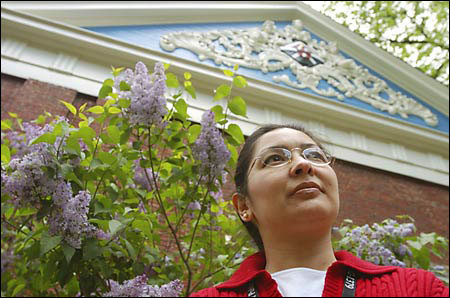A doctor goes home
Combating Afghanistan’s maternal mortality rate

The Afghan province of Badakhshan has the highest maternal death rate ever recorded, with 6,500 women dying in childbirth out of every 100,000 births.
Harvard School of Public Health student Suraya Dalil is trying to change that.
Dalil, an Afghan doctor whose career trajectory is interwoven with the Asian nation’s political turmoil, is completing a master’s degree in public health and is eager to return to Afghanistan and get to work.
“In Afghanistan, every 30 minutes a woman dies [from childbirth-related causes],” Dalil said. “It’s a huge problem.”
The problem’s roots trace back to the war and poverty that has plagued Afghanistan for decades, Dalil said.
Dalil’s medical career began in 1991, when she graduated from medical school in Kabul. She wanted to be a surgeon and was planning a residency at a local teaching hospital. Four months later, however, Dalil said, the mujahedeen fighting the communist government reached the capital. In the fierce street-by-street battles that followed, Dalil said, her father was injured and the hospital where she was to do her residency was destroyed.
Her family fled Kabul for her parents’ home region in northern Afghanistan, settling in Mazar-e-Sharif.
Instead of surgery, Dalil began working with Doctors Without Borders, caring for Tajik refugees pouring over Afghanistan’s northern border from Tajikistan. She worked through the winter of 1992-1993, helping women and children – screening for malnutrition, helping pregnant women deliver babies, and fighting measles and other infant diseases that claimed as many as 10 children per day.
After that, Dalil’s refugee work continued with the International Organization for Migration, but this time she focused on Afghan refugees returning from Pakistan and Iran. Dalil said people arrived at Mazar-e-Sharif tired and hungry, short of medicine, sick from drinking dirty water, and, in some cases, suffering from cholera. The flow of returning refugees eventually ended, however, because of renewed fighting in Afghanistan.
In the mid-1990s, Dalil began work on a large-scale measles and polio immunization program run by UNICEF and aimed at children in nine provinces. At about that time, 1995, the government established its own immunization programs, which Dalil worked to support – in part by helping to coordinate UNICEF’s efforts with the government programs.
In 1998, however, the Taliban reached Mazar-e-Sharif, killing thousands. Dalil and her family escaped on foot, traveling southeast toward Pakistan. They crossed the front lines amid gunfire, losing each other as they fled the fighting but reuniting hours later. They were initially detained at the border in Jalalabad, but eventually made it to Pakistan.
They lived in Islamabad, where Dalil continued working with UNICEF’s Afghanistan office, which was based there. She returned to Afghanistan several times over the next years, training midwives and doctors, but always keeping a low profile.
In 2002, after the Taliban’s fall, Dalil and her husband and children returned to Kabul, where she continued working to improve the health of women and children. Dalil said the Kabul she returned to was very different from the one she left. Her family-owned apartment had been partly destroyed, so they renovated it, but had to live with restrictions on electricity and running water.
“It was really like a new life. It was very different from before, especially for women,” Dalil said.
It was at this point, she said, that various agencies collaborated on the study of maternal mortality, which she helped conduct. She said people knew that mortality was high, but the results showed that, nationally, Afghanistan’s maternal mortality rate was among the world’s highest, with Badakhshan province’s rate outstripping any other mortality rate ever recorded.
Dalil has worked to address the problem with UNICEF, the government, and international nongovernmental organizations. They are seeking to create at least one hospital in each province able to handle critical cases at any time of the day or night. But Dalil said staffing for these facilities is a problem, particularly given that cultural beliefs make it important that women doctors play a role. With a female literacy rate in Afghanistan of just 18 percent and seven years needed to train doctors, Dalil said the problem is as much one of human capital as it is of bricks and mortar.
It was while working to solve these problems that Dalil decided to attend the Harvard School of Public Health. She realized that as Afghanistan builds a new health care system, the country needed to get it right and to have as many Afghans involved as possible.
“This is a very important time for our society, with the reconstruction,” Dalil said.
The year at the School of Public Health was challenging, she said, but she is looking forward first to the graduation ceremony, as her medical school graduation was not marked by an official ceremony, and then to returning to Kabul and her husband and two children.
Dalil said she’s already accepted a position as a project officer for policy and training for UNICEF in Afghanistan, where she’ll work to coordinate UNICEF’s programs with those of donors and the Ministry of Health.




